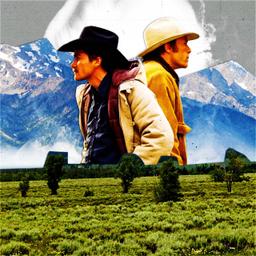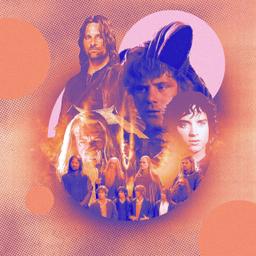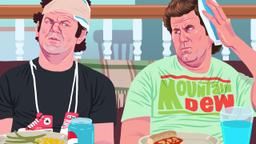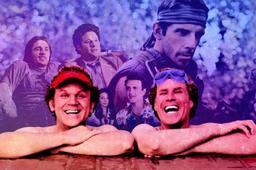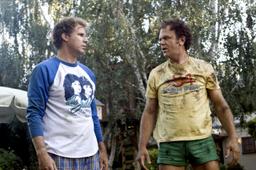Back in January, film critics Manuela Lazic and Adam Nayman began working together on a long list that initially had more than 100 titles on it, in order to sum up something interesting—if not definitive—about the past quarter century of film. Narrowing things down was hard. They spread out their picks as evenly as they could over this 25-year period and also across a variety of styles, and for the rest of 2025, they will be dissecting one movie per month. They’re not writing to convince each other or to have an ongoing Siskel-and-Ebert-style thumb war. Instead, they’re hoping to team up and explore a group of resonant movies. We’re also hoping that you’ll read—and watch—along.
Manuela Lazic: One of my fondest early memories of film criticism was reading a paragraph about the bunk beds scene from Step Brothers in the Cahiers du Cinéma. My sister and I had started reading the celebrated film magazine a few years prior, eager to discover more about quality motion pictures from around the world. We were both amazed to read very high praise for what seemed like a really stupid American movie in its September 2013 issue dedicated to the comedy genre. “Beyond the joke of the bunk beds, a slow burn whose punch line we see coming, it is the almost terrifying conviction with which the two actors play 10-year-old children that makes the scene irresistible,” wrote then-editor Stéphane Delorme. We eventually watched it and wholeheartedly agreed.
Will Ferrell’s and John C. Reilly’s conviction in this scene—and throughout Step Brothers—has never stopped being “terrifying” to me, and rewatching the film for this piece (and for my mental health, as I often do), I was also struck by the precision and subtlety of their performances. Neither of them overacts or tilts into parody at any point in the film, which would have been easy to do. Instead, they have the extreme sincerity of children because that is precisely who their characters are. They allow themselves to be as spontaneous, sensitive, and unreasonable as kids.
Writing about comedies can be particularly hard, especially when so much of the humor comes from physicality and improvisation rather than from witty irony or a tightly constructed script. So much of what makes Step Brothers great is, in fact, its stupidity: The sleepwalking sequence, in which Brennan (Ferrell) and Dale (Reilly) destroy the kitchen in a somnambulistic fog, is so long; Alice’s (Kathryn Hahn) declaration of love to Dale is absurd and gross; why does Brennan ask Dale whether he likes guacamole just before the beds collapse? Yet Step Brothers transcends its own silliness to become a great piece of capital-C Cinema because there is also “terrifying conviction” in Adam McKay’s directing. The Ringer’s own oral history of the film makes clear that the filmmaker takes the silliness of improvisation very seriously: His determination to keep Richard Jenkins’s dinosaur monologue in the final cut (“I wanted to be a Tyrannosaurus when I grew up”), despite the actor’s understandable doubts, paid off and proved to be a gift to Jenkins, whose résumé (and on-screen persona) now shines a little brighter.
By taking childlike innocence and silliness as their guiding principle (I don’t know whether Delorme knew that the bunk beds scene was the original idea on which the entire film was built when he wrote his piece), McKay, Ferrell, and Reilly also gave themselves permission to explode the codes of filmmaking and put them back together in whatever way they wanted—much like kids trying to build bunk beds out of hockey sticks. This is what makes Step Brothers not only hilarious, but enduringly so: I still get so much joy from seeing Dale throw a cup of coffee far into the back of the shot while sleepwalking, and it always reminds me of the first time I learned about depth of field through Orson Welles’s Citizen Kane in high school. The very beginning of the film, with its speed-run montage of Robert (Jenkins) and Nancy (Mary Steenburgen) meeting and getting together, follows and perverts the classic meet-cute formula to take us to a ridiculous place where two grown-up and perfectly able men still live with their parents. The Catalina Wine Mixer is its own wonder, at once parodic of all such musical segments where people forget their previously insurmountable differences thanks to a tune and transgressive in its unapologetic cheesiness; it goes back around to being genuinely touching and rousing through its total sincerity.
Adam, what did Step Brothers do for American comedy? What is its legacy? It has grown to be a classic, but has it inspired filmmakers to let their freak flags fly? I suspect that you may mention the absurdist work of David Wain, whose Wet Hot American Summer precedes Step Brothers by some years and whose 2014 film They Came Together we both adore … and I couldn’t not ask you, a North American man, about this: What does Step Brothers say about America under George W. Bush?
Adam Nayman: We’re on our fourth one of these pieces now, and I’m so glad that we’re friends—friends who ride majestic, translucent steeds, shooting flaming arrows across the bridge of Hemdale. The metaphysics of friendship is a rich topic, and you’ve given me two very nice setups here: a nod to Step Brothers’ opening title card, which quotes Dubya’s sage observation that “families is where our nation finds hope, where wings take dream,” and also the film’s pointed use of LCD Soundsystem’s “North American Scum” when Brennan and Dale first meet.
Both of these references take me back to the halcyon summer of 2008, when hope was audacious, I could see all my friends tonight, and McKay was still funny. I’ve written before about this once brilliant filmmaker’s steady—and, in its way, extremely compelling—fall from grace, yet I’m not remotely tired of contemplating the paradoxes of his work, which you already hinted at. Step Brothers’ greatness is indeed bound up in its stupidity, which is total and liberating, and like you, I have my favorite bits of sublime idiocy. I suspect that long after I have forgotten my children’s names and all of the formative experiences of my adolescence, I will still remember Reilly telling his therapist the plot of Good Will Hunting (“Yeah, anyway, my best friend is Ben Affleck”). But I also think that Step Brothers was the last one of McKay’s movies that was at least willing to risk being seen as actually stupid (as opposed to strategically stupid) and that, in a way, threading this particular needle turned McKay into a victim of his own success. Critics began pointing out, more and more frequently, that McKay was not a maker of stupid movies but a smart director taking stupidity as his subject, and I feel like this idea became aspirational—an invitation to have his dog shit and lick it, too.
This transformation was already underway in the red state burlesque of Talladega Nights, which paired Ferrell and Reilly to superlative effect as NASCAR drivers in the thrall of their own dumbass one-upmanship. (“If you ain’t first, you’re last” is as succinct a description of American exceptionalism as I’ve ever heard.) Of course, good ol’ Ricky Bobby was styled as a Bush manqué, albeit a sneakily likable one, opening Ferrell and McKay up to charges—from liberal critics, at least—of sympathy for the devil. By the time McKay made The Other Guys—an obvious fraternal stepbrother to Step Brothers, swapping out domestic squabbles for cop-movie parody—he had embraced his status as a bipartisan swashbuckler, taking aim at Democrats and Republicans alike in deconstructing the causes and consequences of the 2008 financial collapse. The movie, which is very funny (all hail Dirty Mike and the Boys), concludes with an explanation of Ponzi schemes located somewhere between an SNL sketch and a TED Talk, a combination presaging McKay’s approach in The Big Short, which took aim at stupidity instead of simply embodying it and, as a result, felt weirdly cut off from McKay’s deepest gifts.
On this note: I’m glad that you mentioned Wain, a filmmaker who, to his credit, is never really worried about coming off as smart; he’ll never make anything like Vice. Wain is at his best when he’s at his most playful and infantile, but Role Models, which came out the same year as Step Brothers, represented a sort of détente with studio formulas: Its story line about the need for compromise could be taken as an allegory of itself. Like Step Brothers, Role Models deals with characters stranded unhappily on the far side of their own adolescence; the difference is that where Brennan and Dale are abject grotesques, Danny (Paul Rudd) and Wheeler (Seann William Scott) are basically functional dudes who on some level recognize the need to get their act together. (“I want to rock and roll all night and part of every day.”) Their path to redemption involves serving as father figures to a pair of wayward boys, but even though Role Models is a much more realistic movie than Step Brothers (not a criticism, I love both films; they can go do karate in the garage together), it’s similarly fantastical when it comes to simply wishing things away. At the end of Step Brothers, Brennan’s cathartic, magical-realist rendition of “Por Ti Volare” at the Catalina Wine Mixer absolves him and Dale of their sins; in Role Models, Danny and Wheeler fail miserably as guardians before hugging it out in the midst of an extended LARP session, with no indication whatsoever that their respective breakthroughs will hold in the real world.
This cheerful evasiveness is the legacy of McKay’s producer and mentor Judd Apatow, whose films in the early 2000s tapped into a particular and fertile patch of Peter Pan syndrome; for better or worse, two decades later, the American pop cultural landscape is littered with his bastard offspring. In fact, I’m writing this dispatch in a café that’s played Sabrina Carpenter’s “Manchild” twice in the past two hours—a song that splits the difference between affection and contempt for the sort of behavior that Step Brothers treats, however ridiculously, as a state of grace. I don’t think that Step Brothers would be a better movie if it were more ambivalent about Dale and Brennan, but I also wonder whether all of that absolution strikes you as a cop-out.
Lazic: I’ve always understood Step Brothers more as a joyful document of the symptoms of its era than as an attempt to soothe them, let alone address their cause. Perhaps, in that sense, it is a bit of a cop-out. Yet it is striking how well that film has aged compared with Talladega Nights, a movie that speaks to its time much more directly and much more clumsily. I also don’t take the absolution at the end of all of these films on its face, and a big part of the pleasure of these happy endings is precisely their tacked-on nature. Not only is this throwing up of the hands absurdly funny and a refusal to grant the viewer a real sense of closure, but it also captures something true about—dare I say—human nature. Perhaps families really are where our nation(s) find hope, where living together means, more often than not, trying to live together, making mistakes (like crashing your stepdad’s boat while shooting a rap music video on it), and carrying on as best we can because all we have is one another. These days (always?), hoping often makes us look stupid, but does that mean we shouldn’t do it?
Talladega’s reach is limited by its more logical and traditional plot and, perhaps like more recent McKay films, by its desire to say a lot of things in a funny way. (Like baby Jesus in a tuxedo T-shirt, it's formal but is here to party.) Step Brothers goes several steps further and deconstructs the American comedy, the family, masculinity, and even singing (via its a cappella rendition of “Sweet Child o’ Mine” and Brennan’s combination of Fergie and Jesus), which allows it to signify in a freer, less predictable, more timeless way. Dissertations could be written about the possibilities opened up by the particular phrasing of “I wasn’t fired from my job, I was laid off,” which I’ve never been able to get out of my head.
I realize as I try to describe what makes this film magical that I am in fact talking about it as if it were a free jazz recording—a moment of improvised transcendence, captured for posterity, whose wonder remains forever inscrutable because that is the nature of creativity: We don’t really know where it comes from and why. Much like the bartender in Talladega Nights with the jazz song on his jukebox, I do, in fact, use Step Brothers for profiling purposes, to see whether people have lost their dinosaur or not—whether they take themselves too seriously to laugh when watching two grown men beat up bullying children on a playground. I know that they pass the test when all we can do is start quoting lines from the film at each other—this isn’t exactly the kind of movie that gets discussed in terms of plot or characterization, although, like Cahiers, you can absolutely do that; instead, it’s one to reminisce about and giggle over together with someone. I can’t think of many other films that do that as proficiently.
Do you think that people’s appreciation of Step Brothers should decide whether they can vote or not?
Nayman: Frankly, at this point in the American experiment, I can think of worse ideas. Your question, though, made me think about something McKay said when I interviewed him about The Big Short in 2015. I asked him about the political aspects of his work, and he recalled his experience of being online after Barack Obama’s reelection in 2012 and seeing a phalanx of racist, right-wing tweets and memes integrating images and dialogue from Anchorman. “I hope that our stuff makes the world a slightly better place,” he said, “even if people are also quoting it when they’re saying horrible things.”
McKay was being honest and thoughtful about the reception of his films in a social media sphere that was at the time metastasizing around Infowars and Gamergate—communities that channeled all that ambient early-millennial white-male animus in a different direction from Step Brothers (leading toward our present moment). He also seemed a bit anxious about the upshot of all the blunt, seductive stupidity he’d unleashed on the world. The thing about the Bush quote at the beginning of Step Brothers is that it’s ultimately not fraudulent, at least not in the utopian context of the Catalina Wine Mixer. Families really are where the nation—even North American scum like Brennan and Dale—finds hope and where wings take dream, and now I am tearing up thinking about Brennan and Derek flying kites together as children.
The biggest difference between McKay and Ferrell’s cycle of Bush-centric satires—including the one-man Broadway show You’re Welcome, America!, with its modest proposal that the 43rd president’s tenure had been good, actually—and the anti-Trump PSA The Art of the Deal is that the latter lacks even a shred of playful affection or indulgence for its subject. Instead, it’s just bludgeoning, an example of an irresistible force bouncing harmlessly off an immovable object. Ideally, satire serves as a kind of frontline defense against authoritarianism: I always appreciated the mix of existential angst and life-affirming defiance embedded in McKay naming his early-2000s alt-comedy incubator “Funny or Die.” But there’s also something to be said about crossing the audience’s wires, a specialty of McKay’s subversive hero Luis Buñuel as well as of Paul Verhoeven (the multiplex Buñuel and the only director I’d trust to make a great Trump movie). These days, McKay’s brand is less Funny or Die than Funny and Didactic, a good-intentioned but artistically paralyzing bind exemplified by Don’t Look Up. “We really did have everything, didn’t we?” sighs Leonardo DiCaprio at the dinner table just before the meteor hits, which would be more moving if it didn’t involve buying into the larger dining-room fantasy around it; if anything, the myth that Americans ever had it all—or deserved to—directly contributes to the collective consumerist death spiral McKay means to condemn.
I much prefer the dinner scene in Step Brothers, which contains the smartest joke in the entire movie: Dale’s heaving in full-body revulsion when his father tells him to “grow up.” “I think I’m gonna throw up,” he moans, and the implication in that childish bit of rhyming dialogue—that the thought of maturity (and its big stepbrother mortality) literally makes us all feel sick—is probably the closest the movie gets to genuine profundity. It also actually sets up the next selection for this series pretty nicely. What are the odds that we’d pick back-to-back American classics that are both about fraternal rivalry, coming of age, and the importance of never losing your dinosaur? See you in a month, kemosabe.
